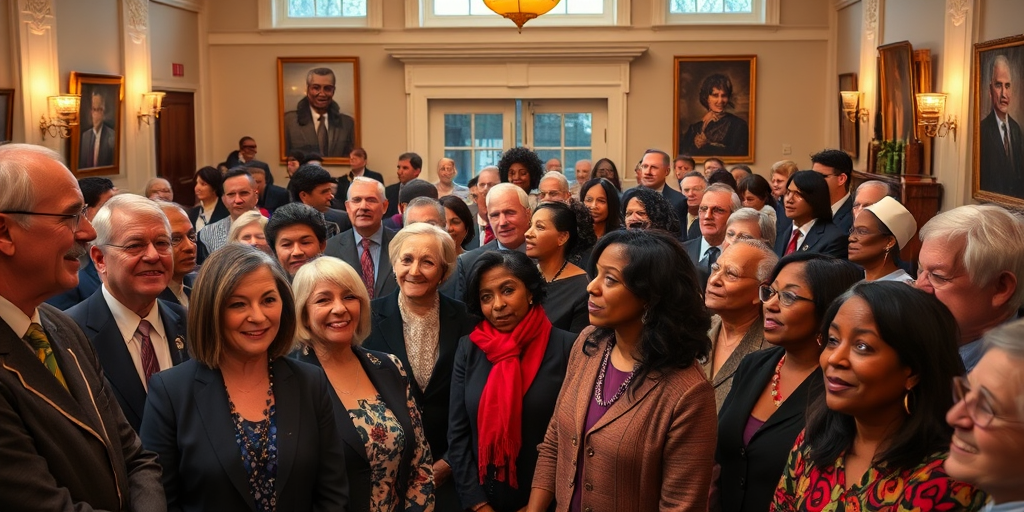Princeton Rededicates Prospect House Spaces to Champion Diversity
In a heartfelt ceremony at Princeton University, alumni, faculty, and administrators gathered in the newly named Alan Turing Garden Room to celebrate the dedication of renovated spaces within Prospect House. This occasion, which took place earlier this week, recognized 12 distinguished individuals connected to the university, echoing a commitment to honor diversity and historically marginalized contributions to campus life.
Honoring Historic Achievements
Among the honorees was social justice advocate Sally Frank, a member of Princeton’s class of 1980, known for her pivotal role in gender equity activism. Frank notably prevailed in a legal battle that challenged the all-male status of several eating clubs at Princeton, a struggle that concluded victoriously in 1992. “It’s humbling to be in such esteemed company,” Frank remarked, referencing other honorees like Alan Turing and John Nash. “Being here, in a room dedicated to a pioneer like Turing, feels like an acknowledgment of fighting for what’s right,” she added.
The dedication was part of a longer-term endeavor initiated in 2023 by the Committee on Naming of the Council of the Princeton University Community. The initiative, spearheaded by Professor Beth Lew-Williams, aimed to recognize individuals who demonstrated outstanding achievement and strong affiliations with the university. “Our goal was to redefine who we honor by considering those who might not fit conventional definitions of success but made substantial impacts nonetheless,” Lew-Williams articulated.
Celebrating Diverse Legacies
Among those celebrated were Katharine Fullerton Gerould, a writer excluded from academic circles within the university due to gender, and Alexander Dumas Watkins, a distinguished African American instructor who significantly influenced the Princeton community despite lacking a formal title. Each honoree’s contribution emphasizes the university’s stride toward inclusive recognition beyond traditional norms.
Vice Provost Michele Minter highlighted the broadened range of individuals recognized and what it symbolizes for Princeton’s legacy. “By honoring these figures, we are not only acknowledging their contributions but also learning from their formidable spirits that shaped the Princeton we see today,” Minter expressed. “Their stories of resilience and innovation continue to inspire our journey towards diversity and equity,” she noted during her address.
Renovations Rooted in Historical Significance
University Architect Ronald McCoy described the restoration of Prospect House as an ambitious project, combining historical reverence with modern advances. “We envisioned a Prospect House that honors its rich past while serving contemporary needs—a place that resonates with both history and progress,” McCoy explained. The renovation is hailed as the most comprehensive in the house’s history, enhancing functionality while celebrating architectural heritage.
Supported by the Office of Institutional Equity and Diversity, the dedication underscores Princeton’s expansive commitment to equity, ensuring that the diverse narratives contributing to the university’s tapestry are rightfully acknowledged and elevated. The community-driven approach reinforces the importance of an inclusive environment for current and future generations.
Community Impact and Future Prospects
For Princeton and its surrounding community, this dedication ceremony signifies more than renaming spaces; it represents a movement towards an inclusive educational environment. Recognizing diverse voices and stories enriches community values and serves as a beacon for participating in broader discussions around equity locally and nationally.
Community members like Jane Doe, a local educator, expressed hope that initiatives like these encourage academic institutions to challenge historic inequities. “These efforts inspire not only students but all residents, pushing us to rethink how we honor contributions, regardless of background,” Doe commented.
With ongoing conversations around diversity, recognizing the individuals who overcame institutional barriers at Princeton serves as a platform for further advances within and beyond university metrics.
Looking Ahead
The dedication of spaces within Prospect House is a tangible step forward in Princeton’s journey toward inclusivity, setting a precedent for similar educational institutions nationwide. As the university embraces this broader historical narrative, stakeholders have the opportunity to delve deeper into past injustices while leveraging them as learning moments for fostering a more equitable environment.
While this dedication marks significant progress, it also demands sustained action and accountability from institutions in upholding these values within everyday academic and community settings. Princeton’s initiative ignites discussions on how universities can contribute meaningfully to social justice, not just in principle but in practice.
For residents interested in learning more about this initiative, Princeton University plans to host educational forums and open discussions to keep these crucial conversations ongoing, offering resources and platforms for engagement.
Princeton’s dedication of Prospect House is a testament to its unwavering commitment to diversity and historical reflection, urging continued advocacy, accountability, and meaningful action.







